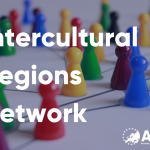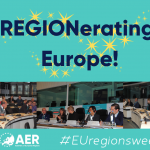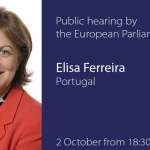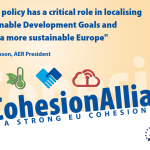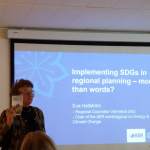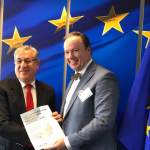The results of the flash Eurobarometer 480 on "Citizens' awareness and perception of regional policy” were published on 7 October, just in time for the European Week of Regions & Cities. The flash survey was carried out on a sample of 700 -1000 respondents in each EU Member State in June 2019. 4 in 10 European citizens are aware of projects funded by … [Read more...]
We are a voice
AER represents its member regions, and stands for stronger cohesion between regions.
During the last Bureau Meeting, AER confirmed its will to help make Europe strong. We will be continuing to advocate for a stronger Europe, through stronger regions.
We are a voice for our members.
Intercultural Regions Network set for launch!
European regions have agreed to establish an Intercultural Regions Network to better work together to develop comprehensive intercultural strategies to manage diversity and migration. The initiative was presented by the Assembly of European Regions and the Government of Catalonia on 5 November at a meeting held at the Delegation of the Government of … [Read more...]
Regions in the Digital Era
The Assembly of European Regions will host a debate focused on the topic of Digitalisation on the 5th of December from 16.15h to 17.45h in Brussels. The 21st century has become the digital revolution era and the European Institutions are responsible for ensuring that this digitalisation is managed in a way that serves the interests of citizens in all EU member states. … [Read more...]
REGIONerating Europe
As part of the European Week of Regions and Cities, AER hosted an event entitled "REGIONerating Europe" focusing on the role regions can play in regenerating the European Project as well as how citizens in the regions of Europe benefit from EU membership through Cohesion Policy, structural and development funds. The European Week of Regions and Cities is an annual four-day … [Read more...]
#EPhearings – Our Candidate for Cohesion?
This afternoon, the European Parliament hearing for Portugal's Commissioner candidate Elisa Ferreira will take place in Brussels. The proposed portfolio for Ms. Ferreira is "Cohesion and Reforms". Read the 'Mission Letter' from Commission President Von der Leyen here. As the largest independent network of regions in wider Europe, AER will follow with great interest the … [Read more...]
Cohesion Alliance One Year On: “Together for a strong Cohesion policy 2021-2027”
On 10 July, our President Magnus Berntsson spoke at the #CohesionAlliance Conference in Brussels. One year after the presentation of the cohesion policy legislative proposals for 2021-2027 by the European Commission, and following the establishment of the first-reading position by the European Parliament and the agreement of the Council on … [Read more...]
Deciding Together on the Future of Europe
After the European elections in May, the EU has embarked on a number of institutional and personal changes. EU leaders meet in Brussels to set out a common future direction: On June 20 and 21, the European Council adopted the Strategic Agenda ahead of the new political cycle. These documents outline the future policy direction for 2019-2024 and guides the work of the EU … [Read more...]
Regions take holistic and wholehearted approach to SDGs
On the morning of 15 May 2019, AER and Oppland (NO) co-organised a Breakfast Seminar entitled "The Sustainable Development Goals and regional growth – Is it possible?", which took place at Oslo Region European Office in Brussels The sustainable development goals (SGD) call upon governments, businesses and civil society to come together and work towards a sustainable planet, … [Read more...]
AER meets Commissioner for Environment
AER President Magnus Berntsson and Secretary General Mathieu Mori met on 10th April 2019 with Karmenu Vella, EU commissioner for environment, maritime affairs and fisheries. This meeting followed the publication of the second Environmental Implementation Review (EIR) package. This review is a tool to improve implementation of EU environmental law and policy. It aims to … [Read more...]
Call for Nominations: AER Political Priorities Task Force
We are seeking nominations from AER Bureau Members to join the AER Political Priorities Task Force by completing the online nomination form available here. Following the decision by the Bureau to set up a Task Force to prepare the AER Political Priorities for the period 2020-2025 at the Bureau Meeting in Gelderland (NL) on 22 November 2018, AER is forming a Task Force to … [Read more...]
AER discusses Digitalisation and Health with European Commissioners
On 20 March, AER had not one but two meetings at the Berlaymont, the European Commission headquarters, in Brussels. Meeting Commissioner for Digital Economy and Society, Mariya Gabriel On Wednesday morning, President Magnus Berntsson met with Commissioner Gabriel to discuss the Digital Europe programme for 2021-2022. Accompanied by Martin Svensson and Anders … [Read more...]
Romanian-Bulgarian cross-border regional cooperation: successes, challenges, and the way forward
The Assembly of European Regions counts among its members four Romanian counties that share a border with Bulgaria. The Danube River winds along the southern edge of Mehendenti, Dolj, Olt, and Calarasi. For these regions, as with border regions across Europe, collaborations with neighbours across the border was not historically always the rule. With the beginning of the EU … [Read more...]
AER reacts to Commission
Following the European Commission's proposal on the EU budget, and more specifically on the future of the Cohesion budget, AER would like to share with you its reaction. We will be keeping on eye on the next developments in the specificities of the budget over the coming days and weeks, so please do not hesitate to contact us with your queries. For Institutional Relations … [Read more...]
Regionalisation in Switzerland: connecting direct “four-fifth” democracy and flexible federalism #RoR2017
Swiss federalism is the result of a long historical process that different actors, institutions and interests have shaped for centuries. One can identify three major factors: the presence of territorial units differing in terms of culture, language, religion, and democratic perception but forced to cooperate for economic and political reasons; a constitution establishing the … [Read more...]
Regionalisation in Russia: persistent asymmetric federalism #RoR2017
Little history of Regional Russia Russia is a country covering a large part of eastern Europe and northern Asia. It became an independent country in December 1991, after the dissolution of the Union of Soviet Socialist Republics (USSR, commonly known as the Soviet Union). The sate-centred hierarchical approach has always been part of the Russian national historical tradition. … [Read more...]
- « Previous Page
- 1
- 2
- 3
- 4
- 5
- 6
- …
- 16
- Next Page »

